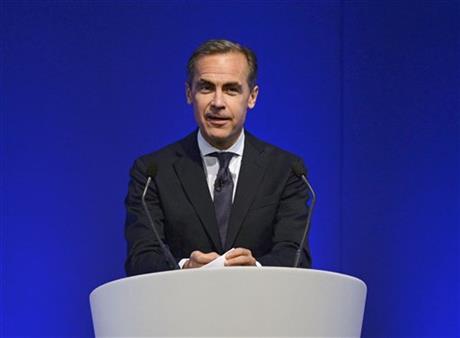
By DANICA KIRKA
Mark Carney, Governor of the Bank of England, speaks during his address to business leaders in Nottingham, England, Wednesday, Aug. 28, 2013. Carney said officials are ready to add stimulus if investor expectations for higher interest rates rise too far and undermine the recovery. (AP Photo/Nigel Roddis, Pool)
LONDON (AP) — The Bank of England’s new governor took his ideas for spurring Britain’s sluggish economy on the road Wednesday, traveling to the heart of the country to convince households and managers that interest rates will remain low and that he won’t follow the U.S. in reining in the bank’s stimulus efforts just yet.
Mark Carney used the speech in Nottingham — a city 110 miles north of the bank’s offices in the City of London — to talk directly to the backbone of the U.K. economy: the owners of small and medium sized businesses.
“The knowledge that interest rates will stay low until the recovery is well established should give greater confidence to households to spend responsibly and businesses to invest wisely,” Carney said.
Carney’s main mission is to shore up the British economy, which has lagged behind competitors in rebounding from the worst global recession since the 1930s.
While the U.S. economy has grown 5 percent over the past five years and China by more than 50 percent, the U.K. still produces 3 percent less than it did at the start of the recession, Carney said.
Carney’s main act since taking the helm at the start of July has been to introduce an element of “forward guidance” to the bank’s monetary policy in order to facilitate investment and spending. The U.S. Federal Reserve has had such guidance for years.
However, the initial guidance fostered some uncertainty.
Earlier this month, he said the U.K’s benchmark rate would remain at a record-low 0.5 percent until unemployment fell from the current 7.8 percent to 7 percent — or about three years. Many economists thought the unemployment threshold introduced meant interest rates may actually end up rising far sooner than expected and Britain’s borrowing rates in the markets rose.
In his speech at a lunch sponsored by the Derbyshire and Nottingham Chamber of Commerce at the University of Nottingham, Carney went further. The 7 percent threshold would not necessarily trigger an interest rate rise. The bank won’t raise interest rates until “jobs, incomes and spending are recovering at a sustainable pace,” he insisted.
“The Bank of England’s task now is to secure the fledgling recovery, to allow it to develop into a period of sustained and robust growth,” he said. “We aim to get there in part by reducing the uncertainty that has held back growth.”
Carney spoke in simple language, ignoring the qualifications and “knockouts” that helped obscure the guidance he made on Aug. 1 and made analysts wary.
Carney also touched on bigger themes. On the international arena, he explained that Britain must detach its monetary policy from that of the U.S.
“While much has been made of the special relationship between the U.S. and U.K., it is not so special that the possibility of a reduction in the pace of additional stimulus in the U.S. warrants a current reduction in the degree of monetary stimulus in the U.K,” Carney said.
Nottingham, a city of about 300,000 people, represents a different economic portrait than London.
“Nottingham is viewed as a bellwether of the UK economy,” said John Colley, director of MBA programs at the school. “It’s very middle of the road.”
But details aside, people in Nottingham were thrilled that Carney decided to visit their city.
“He’s the new kid on the block,” said John Jennings, a consultant with Stable Door Associates, a business and management consultancy. “I think it’s really important that he comes out.”



